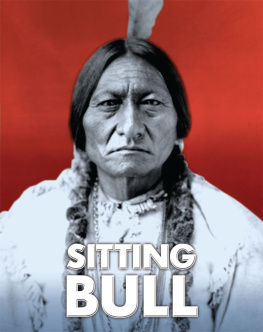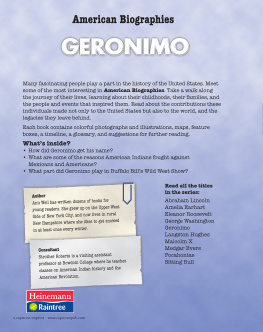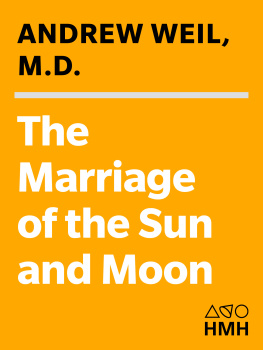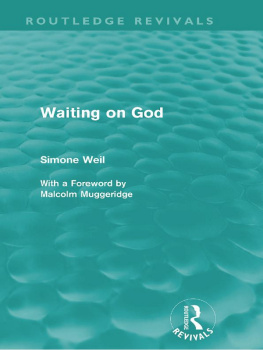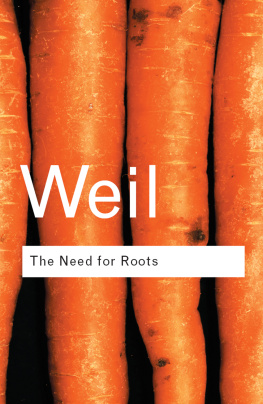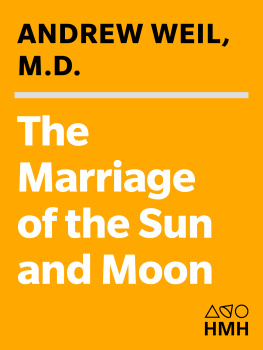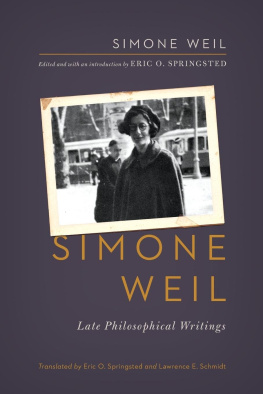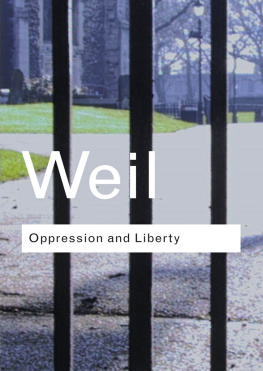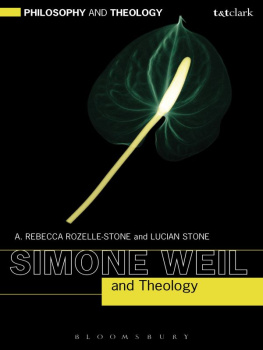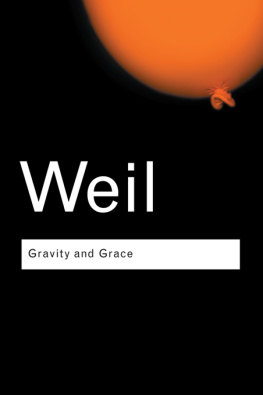

ELIZABETH WEIL
is a contributing writer for The New York Times Magazine. She lives in San Francisco with her husband, Dan, and their two daughters.
MEET THE AUTHORS, WATCH VIDEOS AND MORE AT
SimonandSchuster.com
THE SOURCE FOR READING GROUPS
JACKET DESIGN BY BEN WISEMAN
COPYRIGHT 2012 SIMON & SCHUSTER
ELIZABETH WEILS MARRIAGE TO HER HUSBAND, DAN, BEGAN WITH TWO BASIC GROUND RULES: NO CHEATING, NO DYING. THOSE RULES SERVED THEM WELL FOR TEN YEARS. THEN WEIL STARTED TO WONDER, COULD MY MARRIAGE BE BETTER?
With wit, charm, and bracing candor Weil places her marriage under a bell jar and examines the issues we all facesex, money, mental health, religion, in-laws, childrenthrough a brave and forthright account of her own messy, hilarious, wonderful, and sometimes difficult relationship. Weil shares her belief that marriage doesnt occur while wearing a white dress, standing up in front of friends and family. Rather, it evolves gradually over time, through all the road-rage incidents and pre-colonoscopy enemas, the pleasant and disastrous dinners, the unexpected joys and wrenching decisionsthe small and large moments you never imagined and certainly didnt plan to endure. She seeks out financial planners, sex therapists, psychoanalysts, mar riage coaches, and rabbis. The result is a funny, heartfelt, and ultimately affirming narrative shot through with research on marriage and marriage improvement.
No Cheating, No Dying is an engaging, illuminating read, a profound meditation on love, and a fresh addition to the literature about one of the most universal human institutions.


SCRIBNER
A Division of Simon & Schuster, Inc.
1230 Avenue of the Americas
New York, NY 10020
www.SimonandSchuster.com
Copy 2012 by Elizabeth Weil
All rights reserved, including the right to reproduce this book or portions
thereof in any form whatsoever. For information address Scribner Subsidiary Rights
Department, 1230 Avenue of the Americas, New York, NY 10020.
First Scribner hardcover edition February 2012
SCRIBNER and design are registered trademarks of The Gale Group, Inc., used under license by Simon & Schuster, Inc., the publisher of this work.
The Simon & Schuster Speakers Bureau can bring authors to your live event.
For more information or to book an event contact the Simon & Schuster Speakers Bureau at 1-866-248-3049 or visit our website at www.simonspeakers.com.
Designed by Carla Jayne Jones
ISBN 978-1-4391-6822-6 (print)
ISBN 978-1-4391-6826-4 (eBook)
Portions of this work were previously published in altered form as Married (Happily) with Issues in The New York Times Magazine, December 1, 2009.
Contents
For Dan
1. Please indicate the degree of happiness, all things considered, in your relationship. [Extremely unhappy to perfect, 0 to 6]
2. I have a warm and comfortable relationship with my partner. [Not at all true to completely true, 0 to 5]
3. How rewarding is your relationship with your partner? [Not at all to completely, 0 to 5]
4. In general, how satisfied are you with your relationship? [Not at all to completely, 0 to 5]
tense, rushed
misunderstood, hurried
not listening and not apprehending who I really was
being trampled or smothered
loving and competent
tense, rushed, and not listening
feeling relaxed and known
loved, energetic, encouraged, and approved
No Cheating,
No Dying
1
The Project
I have a good marriage.
I had a good marriage before I spent a year improving it, and I have a good marriage now. In fact, my marriage is better, truly better. Although not in the ways Id expected.
When I set out to improve my marriage, I assumed that better would look like a Photoshopped version of good : essentially unchanged, unsightly elements gone. Dan would no longer butcher headless, skinless pigs and goats on our kitchen island. I would not tidy up, literally and psychologically, by shoving junk in drawers. We would quit outsourcing the production of our childrens religious identities to our parents. Wed stop vibingyes, vibing, we used that wordour bank balances, spending more when we felt flush, less when we felt broke. Instead I got a better marriage in the before enlightenment, chop wood carry water; after enlightenment, chop wood carry water sense. I feel humbled, grateful, and transformed, and Dan is still leaving single brown socks (how to tell if theyre dirty or clean?) strewn about the house.
The first time Dan and I discussed the possibility of a better marriage we were lying in bed, under our white duvet, amid our white walls, in that little sanctuary of peace and purity that Dan had built for us in our flimsy, hundred-year-old earthquake shack of a house. I believed in marriage. I liked being married. But I did not feel expert at it. Shortly after our wedding, nine years prior, wed started to joke that we needed to take more advantage of being two people, that we really shouldnt do our errands together, write for the same editors, read the same magazines. Back then, Dan had felt alarmed, nearly panicked, that some nights wed sprawl together on the couch reading our then-still-separate subscriptions to The New Yorker . Werent lovers supposed to maintain, even exaggerate, differences? Certainly his happily married parents had.
I was an even less likely candidate than Dan for a wholly merged life. One of my more telling memories of myself as a young woman and of how unbending I was in love happened the evening a new boyfriend wanted to make me a cilantro-lime pesto, and instead of walking with him on that warm spring evening to buy limes, I suggested he run the errand alone. By the time I met Dan, at age twenty-eight, Id shed some of that rigidity. I knew more about who I was, so I felt more comfortable being swayed. But nearly a decade into marriage, and sincerely hoping to remain married to Dan for many decades more, I did not understand how much I should be swayed by my husband. What algorithm should determine how much I tipped over into the warm bath of our union and how much of myself to keep separate, outside?
Since our wedding, Dan and I had been bumbling along, more or less successfully, with two basic ground rules: no cheating and no dying. We spoke these rules out loud to each other. We considered their breakages the only trespasses our marriage could not survive. But that night, under our white duvet, as I lay next to Dans warm and increasingly muscled body, I started wondering why we were being so cavalier. Why werent we caring more for our marriage, making it as strong as it could be? Dan is really the very best thing thats happened in my life. He squints like Clint Eastwood. He calls me darling. Hed cook me three meals a day if I let him (which I dont; again, the question of independence). Hes a great conversationalist and he makes me feel like one of the more interesting people on earth. So why were we bumbling ? Why werent we being more deliberate? Ive never been one to leave well enough alone, nor have I ever believed that marriage is binarythat one moment youre single and the next youre not, some alchemy happening at the altar. Ive always believed that you get married, truly married, slowly, over time, through all the dental plaque you inadvertently flick into each others faces; through all the sunsets you watch on remote Baja beaches after youve locked your keys in your rental car, again; through all the near-hypothermic panic attacks because you decided it would be a good idea to swim together from Alcatraz to San Francisco; through all the frozen pig skulls your spouse power saws in half (in order to make pork stock); through all the pain, tears, and absurdity; through small and large moments you never expected to happen and certainly didnt plan to endure.
Next page

